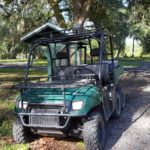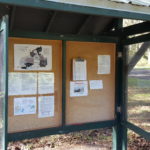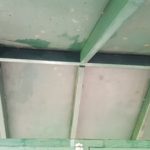Ordway-Swisher Biological Station (OSBS) land was donated to University of Florida by the Ordway Family and Carl Swisher. Most stories I hear center on Mr. Swisher, the creator of Swisher Sweets cigars. He quietly bought up thousands of prime Florida sandhills and pine forest acreage, south of his home in Jacksonville. The land was Swisher’s playground. He connected all the lakes by digging canals between them; this allowed Swisher to go from one lake to the other without getting out of his fishing boat. I am also told that Swisher drove around the land in his Cadillac, probably smoking cigars as he went.
Swisher used the land for economic gain as well. He tapped trees to obtain sap for turpentine production. He cut down many of the pine trees for lumber. Although oranges do not grow this far north, local lore also says that Swisher used orange juice as his secret ingredient in Swisher Sweets.
Swihser died in the 70s, but his old homestead rests under spreading live oaks and next to a smaller lake. A son and/or other relatives have a life estate on the homestead, and they come and go. The property has some escaped house plants that are now invasive weeds. I spent 1 afternoon pulling cat’s claw under ancient trees. It was a pleasant job in a beautiful setting, but I barely made a dent. The seedlings are so dense, the job was more like pulling up a lawn blade by blade. I am told, however, that with persistent pulling, the plant should taper off in a few years.
Swisher donated his land to the University of FL, for restoration and conservation. After a few decades, pine trees anchor the land once again. The site has 7 different ecosystems, including swamps, forests, sandhills, lakes, ponds. Several full-time people tend the land and experiment with conservation practices, such as prescribed burning. OSBS is also living laboratory that University researchers use to study plants, bugs, birds, and other forest dwellers. Recently, a US-based research team, NEON, set up a climate change monitoring station, one of several around the world.

“My” very own 6×6 HOV
So there is the background and here is my drama of the week. I drove around on a spiffy 6-wheeler. Maximum speed is 15 mph on the station. I love the open 6-wheeler because I can see so much more, especially at low speed. Gopher tortoise are the most splendid dry land creatures. I saw a black racer snake, red-headed woodpecker, deer, and hawks. My job Thursday morning was to spruce up the 3 kiosks that sit near each of the gates. The kiosks are bulletin boards with a roof over them, like at National Forests and Parks. This was my first solo task. I grabbed cleaners, rags, a well-used stiff broom with a buzz cut, and set off. This is going to be FUN. Zoom, off I go on the 6-wheeler.

Gopher tortoise. I see them coming out of their burrows and wandering along–young ones too.
I jump off at the first kiosk and check things out. What? Huh? The kiosk was covered in spider webs and, in the eves of the roof, covered with spider egg cases clinging fiercely. Gulp. Even though I hate spiders, as I recently confessed, I cried during the movie Charlotte’s Web with all the cute, cartoon spiders. Should I rebel and stick up for all the unborn spiders, who were, perhaps, Charlottes great-grandchildren? No, your job is to clean this up, I weakly told myself.

OSBS kiosk
I needed to devise ways to pull down the mess without actually touching it. The broom brought down the larger webs, but egg cases were shoved into every little crevice. I zoomed up to my nearby campsite and grabbed a stiff cleaning brush and Simple Green. They didn’t do much either, so I zoomed back to the campsite and looked around again. I settled on a spatula and my ice scraper. They worked, and I slowly scraped egg cases. Sometimes, I stopped to shudder, but eventually it went well. Good thing, because I had 2 more kiosks! The first was the worst.

After a half hour of poking and sweeping, the roof still had lots of spider egg cases.

Thanks to my ice sraper/windshield brush, I get the job done!
But that is not the end of spiders that day. As I traveled to the next kiosk, I looked up, hoping to see some birds. Instead, I saw a giant spider web stretching across the road, attached to trees on either side, about 40 feet up. Like a bulls-eye, a large spider sat in the middle. I don’t know how large but from 40 feet below it seemed huge, maybe the size of a fifty cent coin. I had chills when I drove under it. I pulled over and brushed myself off, just in case. Later, I saw another high-living spider on another web spanning the entire road. Later, when I walked with Tango around the camp site, I looked up and saw two more. The good news: spider season is winding down.
That is what being on land not used and abused by the masses is like. Creatures of all kinds spin webs, dig burrows, crawl slowly, stalk silently, fly freely. This is Woodstock for the animals. Gators wallow in the mud, love bugs copulate incessantly, and birds or cicadas sing all day, sometimes into the night.
This kind of wildness does not occur in popular National Forests and other nature hot spots. People kick over mushrooms, stomp on spiders, squish bugs, carve into trees, capture snakes, steal antlers for resale. Living on conservation land is a real treat. I feel it’s wildness and love its diversity.
I appreciate it even more when I drive by former forests that are mowed down to make space for homes. Coming home from Jacksonville yesterday on back roads, I passed a long stretch of downed trees. They were pushed into huge brush piles. A bit further down the road was the completed Phase One of the development. I dislike that even worse than the spiders, and I was relieved to get back to Woodstock.
What will I see today?




Nothing so resistant to removal as a spider sac! Nature has really conspired to ensure spiders survive. I don’t like them. They creep me out. But I do appreciate the fact that there are places where nature is protected. You are doing such a good job!
Glad to hear I am not the only one who fears spiders! Thanks for the encouragement!
Keep them eyes peeled and don’t stick your hand in dark places. Might what to carry along a nice long walking stick. Cool history on the Swishers!!
Ha ha. I dug out my hiking stick and an old ski pole the first day I got here! I have never skied but the pole is a great weapon should I need one!